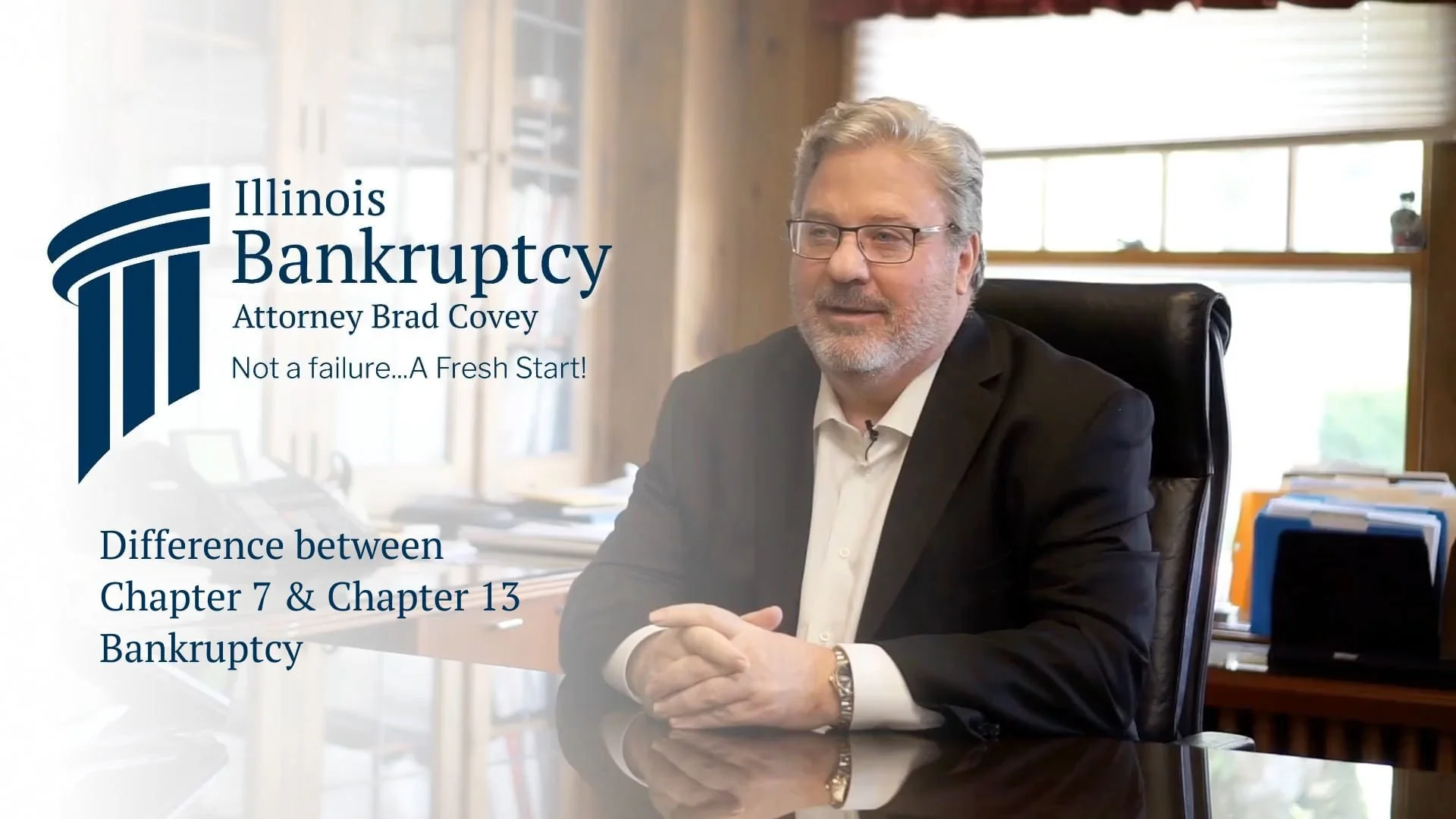Bradley S. Covey is a Chapter 7 attorney and Chapter 13 attorney at Covey Bankruptcy Law Firm, P.C. in Batavia, IL. Brad has been helping people file for Chapter 7 and Chapter 13 bankruptcy for over 30 years. Bankruptcy…Not a Failure but a Fresh Start!
Trusted Bankruptcy Attorney in Illinois
Bradley Covey
From the moment you sit down with Brad for your free consultation, you will see that we are a different kind of law firm. Your consultation lasts until all your questions have been answered. Brad will explain chapter 7 and chapter 13 and let you know your options. He won’t be looking at the clock and he won’t be using scare tactics to get you to retain us. Offices in Batavia, Wheaton and Plainfield and we cover all of Kane, DuPage, Kendall and Will Counties in Illinois.
Bankruptcy Basics
Meet Brad and learn the difference between
Chapter 7 & Chapter 13 bankruptcy.
When it comes to bankruptcy, understanding the differences between Chapter 7 and Chapter 13 is crucial. In this video, we'll explore these two options and help you determine which one suits your financial situation best. Let's dive in!
Always consult with an experienced chapter 7 bankruptcy lawyer or chapter 13 bankruptcy lawer.
Experienced Chapter 7 bankruptcy lawyer Brad Covey explains filing chapter 7 bankruptcy in Batavia Elgin Wheaton Plainfield Kane DuPage Kendall Will County Illinois from Attorney Brad Covey.
Learn our process of helping you through a chapter 7 bankruptcy.
Learn More
Bankruptcy FAQs
We are committed to helping you get a fresh start just like we’ve been doing for so many like you over the past 30 years.
-
This process goes the fastest when you are committed to being responsive to things we ask you for. We work hard at making it as easy as possible for you and we pay special attention to helping you through the humps most people get stuck on.
-
The days of the “general practitioner” are gone. Today most lawyers only handle one or two types of law. If the lawyer you are interviewing lists more than two practice areas of law, that is a red flag. The bankruptcy laws are very complex and changing all the time. To hire a lawyer that does not concentrate his practice in bankruptcy law would be a serious mistake.
-
I urge you to not ask “How long have you been practicing law”. What is important is how long the attorney has been practicing bankruptcy law. Some lawyers change the type of work they do throughout their career. For instance, currently there are many Illinois lawyers who very recently began practicing bankruptcy law because their real estate or divorce practice dried up and they had no work. Now they are practicing bankruptcy and have little or no experience or knowledge in bankruptcy law. They may have been an attorney for 20 or more years…but do they know bankruptcy law?
-
Within any area of law there are many types of cases. In bankruptcy there is Chapter 7, Chapter 9, Chapter 11, Chapter 12 and Chapter 13. Each chapter has its unique bankruptcy procedures and complications. It is important that the attorney you hire has experience with these bankruptcy procedures and complications and can advise you on the probable outcome of your bankruptcy discharge.
-
Of course it is important to know the law, but it is equally important to know the local judges, trustees, clerks, and other attorneys. Your bankruptcy attorney needs to know what these bankruptcy judges and bankruptcy trustees will and won’t allow as well as what they like and don’t like. The attorney who is a regular in the court where your case will be heard is in a better position to get the best outcome for you.
-
Although each case is different, most cases follow a general outline. Your bankruptcy attorney should be fluent enough in bankruptcy law to give you an outline of how your case will flow, including timelines and possible variations for Chapter 7, Chapter 13 and chapter 11.
-
Sometimes, the experienced attorney you meet with will not be the attorney handling your case or even the attorney going to court with you. You should know up front who will be working on your case, answering your questions, going with you to court and ultimately responsible for your case. Particularly in bankruptcy, it is common practice for the bankruptcy lawyer you hired to pay another lawyer a small fee to “show up” at your creditor’s meeting where the trustee will be questioning you under oath. Do you really want someone you have never met representing you in such an important meeting?
-
You need to keep informed about your case and how it is proceeding. Ask what you can expect as far as regular communication from your bankruptcy attorney. You should expect to hear from your bankruptcy lawyer during the time your case is being prepared, before your meeting of creditors, regarding reaffirmations and when your case is discharged. The last thing you want is to pay your lawyer and never be able to contact them again.
-
Communication is key. Avoid frustration by getting a clear idea of the best way to communicate with your attorney. Some lawyers love email, others like telephone calls, and still others like in person meetings. Hire an attorney that communicates the way you like to communicate.
-
Although you should not entirely base your decision on the fee (remember, you get what you pay for), you should ask what the bankruptcy lawyer’s fee will be, what it includes and when it needs to be paid. Your bankruptcy lawyer should provide you with a written fee agreement before any services are rendered. The fee agreement should outline whether the fee is a flat fee or an hourly fee and should include costs, such as filing fees. If you are filing Chapter 7 bankruptcy then the fee must be paid in full before your case is filed. If it is not paid in full prior to filing you do not have to pay your attorney any money after your case is filed because that fee is a debt and discharged (wiped out) by your bankruptcy discharge.
-
Any lawyer that enjoys his/her job is a lawyer that is more likely to do a good job and care about the outcome. Try to get a sense of whether the attorney is burned out and just going through the motions or whether they seem enthusiastic and ready to represent you to the best of their abilities.
I would urge you to interview a couple attorneys to gain some perspective and find the right fit for you and your situation.











